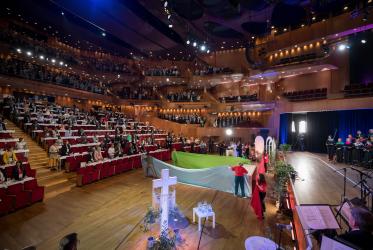Lutheran World Federation Council
June 2015, Ecumenical Centre, Geneva
World Council of Churches – Greetings
Delivered by Natasha Klukach, WCC programme executive for Relations with Member Churches
President and vice-presidents, general secretary, members of the Council, representatives of member churches, sisters and brothers in Christ,
“And hope does not disappoint us, because God’s love has been poured into our hearts through the Holy Spirit that has been given to us.” (Romans 5:5)
It is my honour and privilege to convey to you the greetings of the World Council of Churches on behalf of our general secretary, Rev. Dr Olav Fykse Tveit, and moderator, Dr Agnes Abuom. The relationship of the World Council of Churches with the Lutheran World Federation is a close one, even in sharing the space of the Ecumenical Centre for our work. This proximity offers us a spirit of togetherness, the ability to bring together resources, share in common reflection, and to cooperate on a daily basis. Yet this relationship is made even more significant because of a complementarity of vision. In a world where there are too many places of brokenness and division, together we strive to be witnesses of our common faith seeking healing and wholeness, justice and peace. The leadership of the LWF in diaconal ministry, most especially in this time of crisis working with refugees and migrants, is an inspiration to the ecumenical movement.
As a fellowship of churches, the WCC is deeply enriched by the gifts of your member churches through their theological and liturgical traditions, prayerfulness and discipleship. You gather together now for this Council meeting under the theme “hope does not disappoint.” Your churches’ commitment to strive for an ever stronger communion is in itself a sign of hope for the ecumenical movement. The qualities you seek in your common life through Eucharistic fellowship, calling one another to deeper relationships in Christ, taking action together to address urgent needs around the world, and finding graceful means to speak about issues with strong and divergent perspectives all embody the spirit of Jesus’ prayer “that all may be one.” Know that your efforts undertaken here in this Council meeting to deepen your own relationships as Lutheran churches have impact beyond your communion. Even as you seek the signs of hope “that do not disappoint” in considering the pain experienced in different global contexts and finding ways of moving forward in challenging discussions, you offer something invaluable to the oikoumene.
At this moment in the ecumenical movement we are moving together on a Pilgrimage of Justice and Peace. It is a pilgrimage that is fundamentally spiritual; it is a pilgrimage that proclaims that the church’s vocation is and must be to right injustices and to work against violence in all its forms. For this pilgrimage to have meaning, it must provide people a right to hope, a real hope that is solid and steadfast because of God’s love. In our broad fellowship of churches we firmly believe that the lived experience of your communion and the results of this Council meeting will offer new motivation in this journey forward.
Once again, I offer my own thanksgiving to be with you for this meeting. I assure you of the prayers of our general secretary and moderator, and the commitment of the World Council of Churches to accompany you as a communion, continually growing into God’s hope and calling for your common life together.




